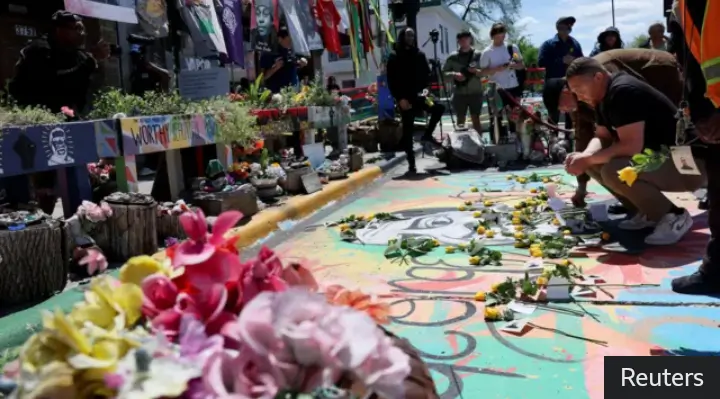Five Years Later, America Remembers George Floyd with Tears, Resolve, and a Waning Hope
By Ricky Awodi
It has been five years since George Floyd’s life was pinned to the pavement under a police officer’s knee — five years since the world gasped, cried, marched, and demanded change. On Sunday, from Minneapolis to Houston, across parks, churches, and street corners, Americans gathered once again to remember him — and to ask what, if anything, has truly changed.
In Houston, where Floyd was raised and now rests, his family stood by his gravesite. The Rev Al Sharpton, flanked by community leaders, politicians, and friends, led prayers and urged the nation not to let Floyd’s death be in vain. There were poems, gospel songs, and open hearts — all trying to speak to a grief that has not dulled with time.
“George was more than a symbol,” said one speaker. “He was a father, a friend, a soul. And the world saw him cry out for breath.”
In Minneapolis, where Floyd was murdered on May 25, 2020, the air at George Floyd Square felt heavy. The corner where he drew his last breath has become sacred ground — a place of pilgrimage and protest. The Rise and Remember Festival, an annual event founded by Floyd’s family, brought together civil rights activists, artists, and thousands of mourners. A morning church service opened the day, and a powerful evening gospel concert echoed into the night.
Angela Harrelson, Floyd’s aunt and co-chair of the festival’s organizing group, reminded the crowd, “Now is the time for the people to rise up and continue the good work we started.”
But for many, hope is fading.
Back in 2020, Floyd’s killing sparked a global movement. Millions took to the streets. The phrase “Black Lives Matter” rang across continents. Police reform and racial justice became rallying cries. Under President Joe Biden, the U.S. Justice Department launched sweeping investigations into police departments — from Minneapolis to Mississippi — uncovering deep-seated patterns of abuse and misconduct.
Yet in 2025, with President Donald Trump back in office, much of that momentum is unraveling.
Last week, his administration dismissed findings from those federal investigations as flawed and politically motivated. Agreements aimed at reforming police departments — consent decrees mandating accountability, training, and transparency — are now under threat. Trump officials argue they are “handcuffing” police.
Even symbolic progress is being erased. The iconic Black Lives Matter Plaza near the White House has been removed. A Houston mural honoring Floyd was quietly demolished. And across the country, Diversity, Equity, and Inclusion (DEI) programs — some born in the wake of Floyd’s death — are being dismantled.
At a recent speech to West Point cadets, Trump defended these rollbacks, saying the military must be free from “distractions” and focused on its “core mission.” Critics fear this is more than political rhetoric — they call it a systematic undoing of a reckoning that barely began.
And the numbers seem to agree. A recent Pew Research Center survey found that 72% of Americans believe there has been little or no progress in improving the lives of Black people since Floyd’s death. Public support for Black Lives Matter has dropped by 15% since its 2020 peak.
Still, on this somber anniversary, beneath the sorrow and frustration, a quiet resolve lingers.

Rev Sharpton, in a post on X, reminded the world why Floyd’s name must not be forgotten: “His death forced a long-overdue reckoning with systemic racism. The conviction of his killer was a rare step toward justice. But our work is far from over.”
And for those gathered at George Floyd Square or standing quietly at his grave in Houston, the work continues — in marches, in prayer, in memory. Because five years later, America is still holding its breath.


